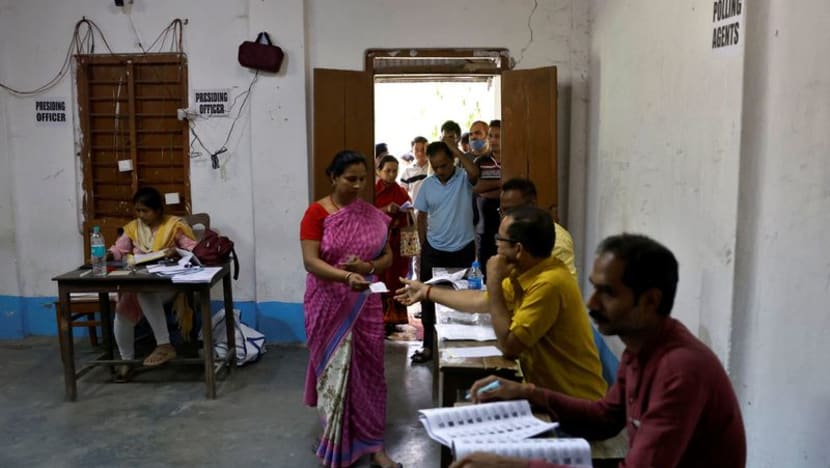Commentary: Is political incivility driving away voters in India’s 2024 election?
India’s 2024 election has seen a significant shift in the political rhetoric of BJP and Prime Minister Narendra Modi, says NUS’ Taberez Ahmed Neyazi.

People arrive to cast their votes at a polling station during the first phase of India's general election, in Alipurduar district in the eastern state of West Bengal, India, on Apr 19, 2024. (Photo: Reuters/Sahiba Chawdhary)

This audio is generated by an AI tool.
SINGAPORE: Concerns about India's ongoing elections initially centred on the potential for deepfakes and AI-driven misinformation to sway public opinion.
However, as the campaigns have unfolded, a more immediate and disconcerting trend has emerged: Political leaders are increasingly exploiting ethnic fault lines and employing divisive rhetoric.
This strategic incivility has overshadowed earlier fears of digital manipulation, and has led to a palpable disenchantment among the electorate. Voter turnout in the first three phases of the election has been lower compared to India’s 2019 parliamentary polls.
Political commentators are debating whether this decline could disadvantage the ruling Bharatiya Janata Party (BJP), potentially benefiting the opposition. Research has yielded contradictory evidence, indicating that low turnout can sometimes benefit the incumbent and at other times favour the opposition.
The reasons behind the lower voter turnout are complex. Although circumstances such as extreme heat have been proposed as contributing factors - despite past elections also occurring during the summer - the primary concern may be a lack of enthusiasm among BJP voters, which would indeed be a worrying sign for Prime Minister Narendra Modi’s government.
On top of that, might growing incivility in political campaigns be driving away potential voters?
A SHIFT IN MODI’S RHETORIC
Incivility is characterised by actions that endanger democracy and reinforce harmful stereotypes against social groups. While incivility remains a notable feature of India’s election periods, it can heighten partisan animosity and deepen ideological divides, leading to a more fragmented society.
For instance, the use of derogatory and offensive language increases the likelihood of individuals perceiving their political opponents as morally inferior. Moreover, the rise of incivility in political discourse discourages political engagement by eroding trust in democratic institutions and diminishing confidence in the electoral process.
In this environment, voters may become disillusioned, leading to decreased voter turnout and further entrenchment of political apathy.
It is in this context that the 2024 election campaigns should be analysed. This campaign has seen a significant shift in the ruling party’s political rhetoric, with personal attacks against the Muslim minority led by Prime Minister Modi himself.
Previously, Mr Modi promoted the inclusive slogan “sabka saath, sabka vikas” (together with all, development for all). While he often criticised the opposition, particularly the Congress Party, for their appeasement of the Muslim minority, these criticisms were typically conveyed through dog-whistle politics rather than direct attacks.
For example, during the 2015 Bihar assembly campaigns, he attacked the then grand coalition led by Nitish Kumar and Lalu Prasad for allegedly plotting to reduce employment and higher education quotas set for marginalised groups to benefit “a particular community” - insinuating India’s Muslim community.
However, such veiled attacks are no longer a feature of Modi’s speeches. He now openly targets opposition parties for their support of the Muslim community, a community he labels as “infiltrators” and “those who have more children”.
Meanwhile, official BJP handles on Instagram and X have posted videos falsely accusing the Congress Party of taking away resources from disadvantaged castes to benefit Muslim Indians. On May 7, India’s Election Commission directed X to remove one such video.
NEGATIVE EFFECTS OF POLARISING CAMPAIGNS
The BJP's recent electoral successes have hinged on getting their supporters to the polls. Yet, voter fatigue, anti-incumbency, and disillusionment may have prompted the BJP to ramp up its rhetoric.
Such uncivil campaigns, however, could have a negative effect on prospective BJP voters and provide the opposition with an opportunity to galvanise their own base.
Our research in the context of the 2021 West Bengal and 2022 Uttar Pradesh assembly elections found that incivility in the campaigns have a negative effect on turnout intention.
While incivility may mobilise extreme partisans, in contexts where a large number of voters remain non-partisan, polarising campaigns can undermine the incumbent's support. We might witness a further decline in voter turnout if uncivil campaigns and inflammatory rhetoric from PM Modi continue.
As political participation is an essential element in any healthy democracy, incivility is harmful to the proper functioning of democracy. The 2016 US presidential election illustrates how unchecked incivility can dominate the political narrative, overshadowing substantive policy discussions and undermining the democratic process.
While the BJP may believe that heightened rhetoric will energise its base, the strategy carries significant risks and ultimately affects the fabric of Indian democracy. Increased polarisation reduces the space for deliberative cross-party discourse.
This is harmful to Indian democracy, as winning elections should not be the only goal of a party or the prime minister. Instead, protecting democratic institutions and promoting democratic values should be a long-term priority.
Taberez Ahmed Neyazi is assistant professor of political communication and new media and Director of Digital Campaigns and Propaganda Lab, National University of Singapore.
















